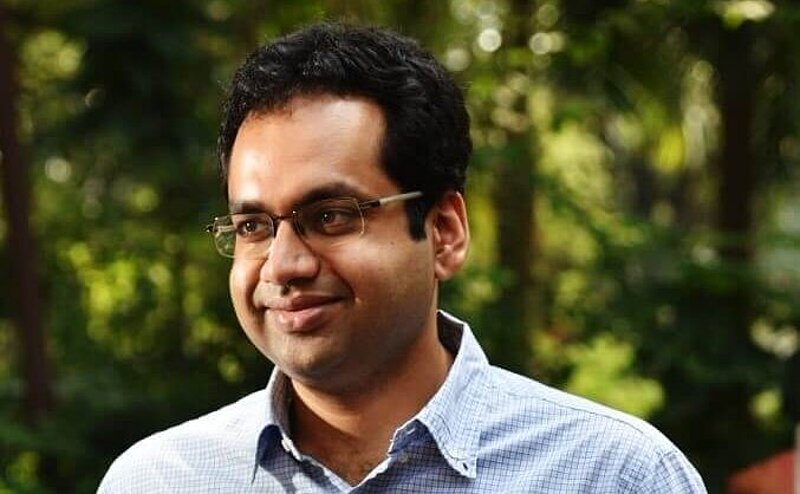
Sahil Deo contributed data-based research to track various aspects of the pandemic.
When Sahil Deo travelled from Berlin to Japan in January 2020 to receive an innovation award for his consulting firm, he noticed something unusual.
“It was the weekend of Lunar New Year, and the folks at the reception suddenly started wearing masks,” he recalls. “In Europe, people were not yet aware of the potential pandemic. That’s when the gravity of COVID-19 dawned on me and I began to treat it as a topic that we should track, we as a firm, and me as an individual.”
Deo, a PhD researcher at the Hertie School, originally comes from Pune, India. He first moved to Berlin in 2012 to do a Master of Public Policy (MPP) at the Hertie School. Deo’s PhD dissertation, which he plans to submit in June, focuses on operationalising explainability in the context of tech-based financial services (FinTech). His research analyses this issue from the perspective of the private sector, regulators and users. In addition, it focuses on the trade-off between algorithmic performance and explainability.
A computer engineer by training, Deo got his start working in Morocco and Egypt building financial models for renewable energy before he came to the Hertie School.
“I always wanted to start a consulting firm and didn’t want to exclusively be an academic,” he says. “I had never studied social sciences before and always wanted a degree where I would be exposed to the theory and background working around public policy.”
While still studying for his MPP in Berlin, Deo and his Hertie School classmate and friend Christian Franz co-founded CPC Analytics. The consulting firm provides data-driven insights to decision makers from both the public and private sector. Key clients include WHO, GIZ, SDC, Siemens and Mitsubishi Materials. Today, the company operates out of Berlin and Pune.
Tracking lockdown measures and the vaccine rollout
Deo returned to Pune from his trip to Japan in early February. In India, he says, the lockdown started on March 22, which gave him around 1½ months of headway in terms of thinking about how his consulting firm might contribute analytical data to tracking a possible pandemic.
“In the Indian context, I was keenly tracking data,” Deo says. “I work with a lot of government agencies in India on various policy topics and already had access to these organisations and the people. Therefore, it was relatively easy to disseminate an initial analysis on the situation, which we conveyed to different government stakeholders, helping them with the user data to act against COVID-19.”
In particular, he looked at the effectiveness of lockdown measures in India. He wrote more than a dozen research papers and disseminated his findings in podcasts, media appearances and videos, as well as a special report for Observer Research Foundation on the lockdown measures.
Since July 2020, India has worked on the question of vaccine distribution and has one of the largest vaccine rollouts in the world. Pune, where Deo is based, is one of India’s major pharmaceutical manufacturing hubs, so it is at the core of the vaccination process, with many of the vaccines for both developing and developed countries being manufactured in the city. He was involved in computing the phase-wise vaccine requirements at a district level in India.
“The goal is to vaccinate 300 million people by September,” he says, adding that there are four priority groups: health workers, frontline workers, senior citizens and those with special health conditions.
Luckily for India, Deo says, it’s mostly larger cities that are most affected by COVID-19, which tend to have better logistics and distribution networks.
“The real challenge will be to get these vaccines to the more remote parts of India, but at the same time, it will be as difficult for COVID-19 to reach these parts as well,” he explains.
Before the lockdown, Sahil was in India to complete the empirical research of his dissertation. Currently, he isn’t allowed to travel internationally but is able to move around the country as necessary for his work, though some regions require COVID-19 tests.
Together with his wife, he also takes care of his ½-year-old son who currently can’t go to kindergarten because they remain closed. When travel is possible again, Deo plans to return to Berlin.
“I miss the vibrancy of the city and the vegan food,” he says. “I don’t eat meat and I don’t drink alcohol, but I like that Berlin still allowed me to have different culinary options. I could even have a vegan sausage.”
Find Sahil Deo's latest publications and media appearances here:
50 days of lockdown: Measuring India’s success in arresting COVID-19
COVID-19 Vaccine: Development, Access and Distribution in the Indian Context
The Mojo: Largest Vaccine Rollout To Take Place in India
The Hertie School is not responsible for any content linked or referred to from these pages.
Views expressed by the author/interviewee may not necessarily reflect the views and values of the Hertie School.
